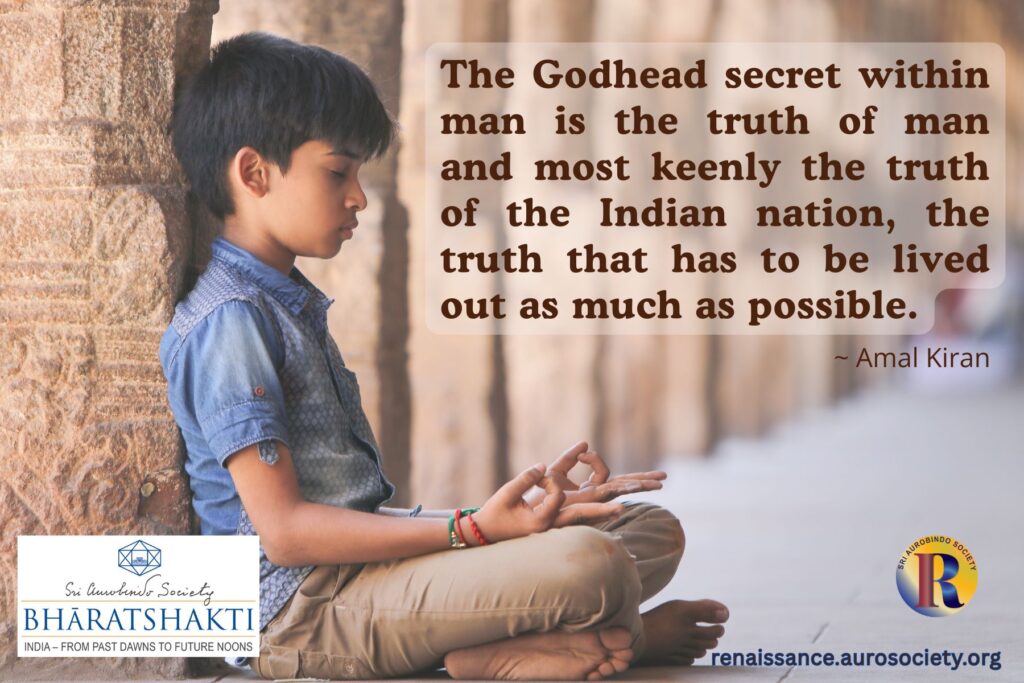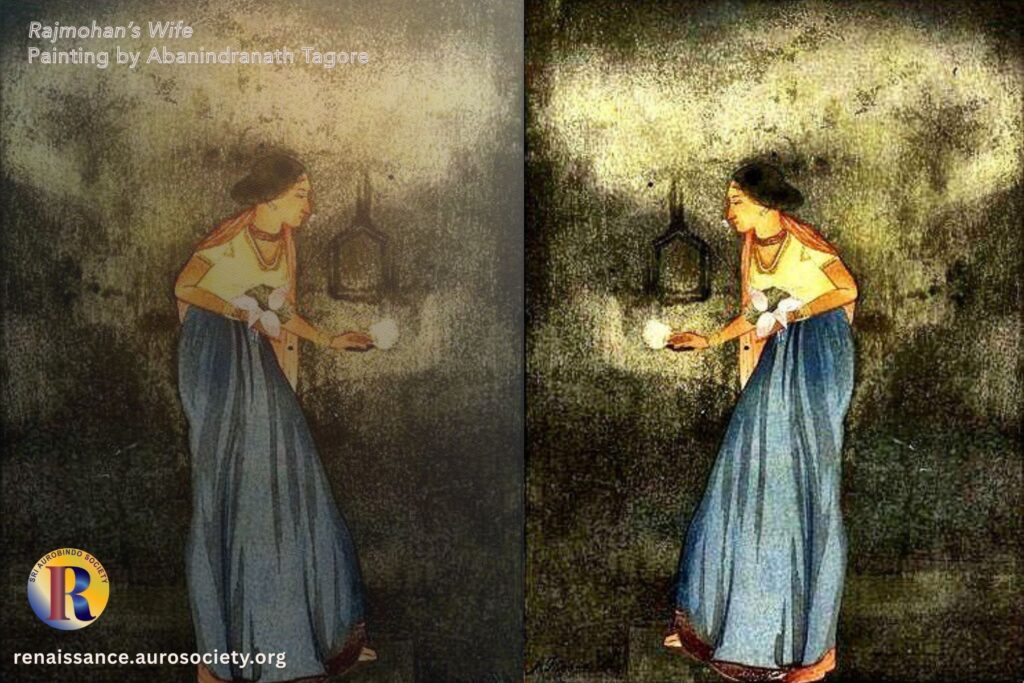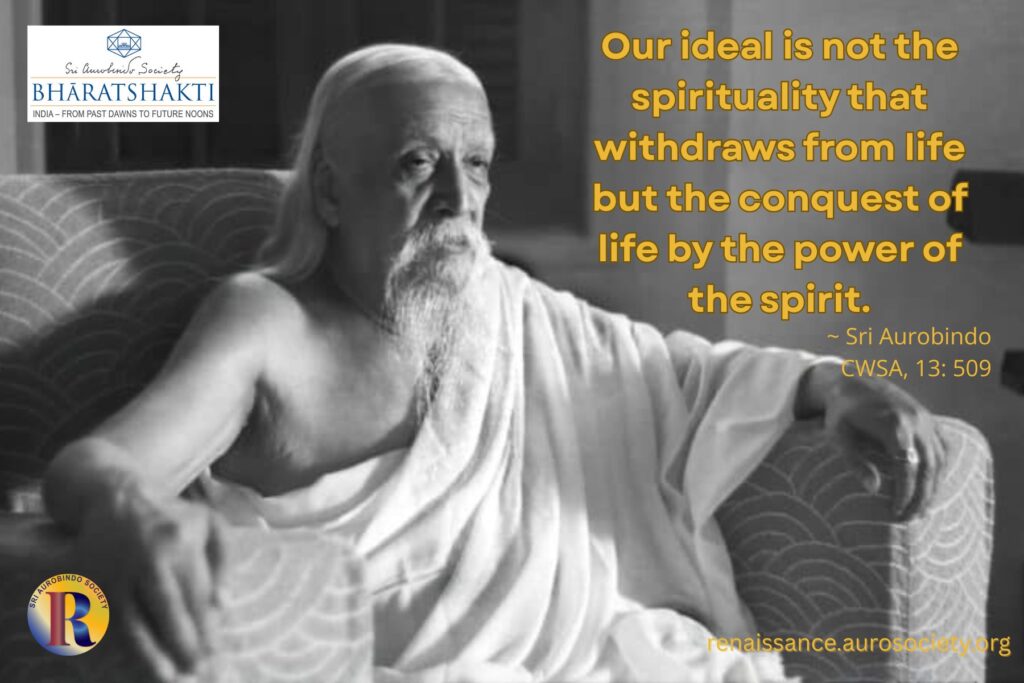Volume II, Issue 5
Author: Dr. Alok Pandey
Editor’s Note: We are reproducing here in three parts a long essay written by Dr. Alok Pandey a couple of years back, which was originally published at auromaa.org. The original essay is slightly shortened for our purpose, without losing any of its core essence. We are grateful to the author for his kind permission to republish the essay in Renaissance.
Part 1
The Evolutionary Struggle as a Battle
Durga is the Mother’s power of Protection.
(Sri Aurobindo, CWSA, Vol. 32, p. 69)
The lion is the attribute of the Goddess Durga, the conquering and protecting aspect of the Universal Mother.”
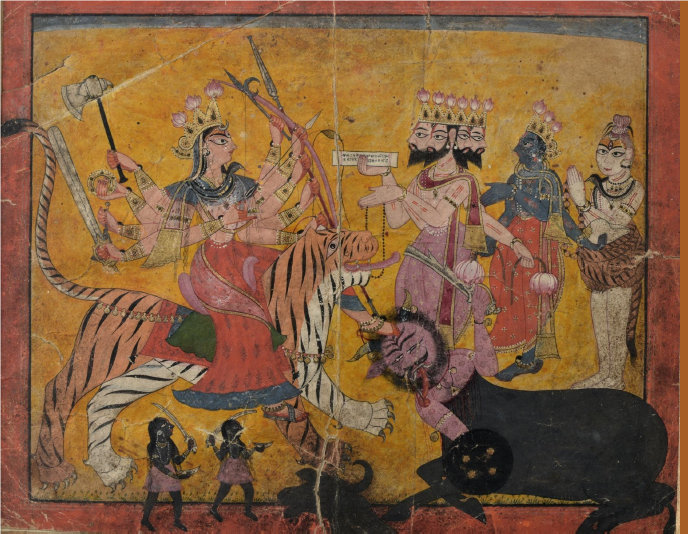
Credit: National Museum, Delhi
The Festival of Devi is celebrated in India to mark the victory of the great Goddess Durga over the demon King Mahishāsura and his demon cohorts. Though outwardly it seems to be symbolic of the victory of Truth over falsehood which of course it is, there is much in it to help us understand the process of individual and cosmic evolution.
The ancient yogis and seers saw the process of rebirth as the evolutionary journey of the human soul. The soul is the divine essence that has been buried in matter as the seed of divinity. It is like a seed that has been placed carefully in the soil so that one day it will start awakening and grow in man and arrive at the full fruition of the divine possibilities embedded within it. Until coming of man it remains dormant in the lower forms of creation much as a seed stays under the soil preparing within to one day start a new journey upwards.
With man comes a point of transition because man has the ability to experience life somewhat consciously and through reflection and contemplation enter into some kind of conscious evolution. Before the coming of man evolution is an unconscious process. Something of course is happening thence too but it is more like the dissolving of the hard outer crust of the seed. With the advent of humanity, at least after a certain stage this hard crust of Ignorance, the denser thick veil begins to become slightly more amenable to dissolution.
At first of course this urge for freedom from ignorance takes the form of mental education, a mental seeking to know about oneself and the world around rather than being satisfied with a life of instincts driven by hunger of various kinds, ‘a hunger that is death’, as the Upanishad says. This hunger, not only for food but for all other kinds of material things and objects and the will to acquire and possess more and more is the sign of this craving self of desire is the great badge of ignorance that all creatures wear.
But a time comes when this first formulation of life no more satisfies us. Man begins to seek something greater, something higher, something that can endure the rub of change and time, something permanent and eternal. It is here that the soul in man begins to awaken and a new phase of its journey begins.
This journey begins to assume the form of a battle, a battle between the animal state out of which it must emerge and which continues to torment and assail through the various hungers now modified and made worse by the presence of a mind that is at the mercy of the desire-self. The mind adds to the animal appetites a certain perversion with its capacity to deceive and the will towards endless gains.
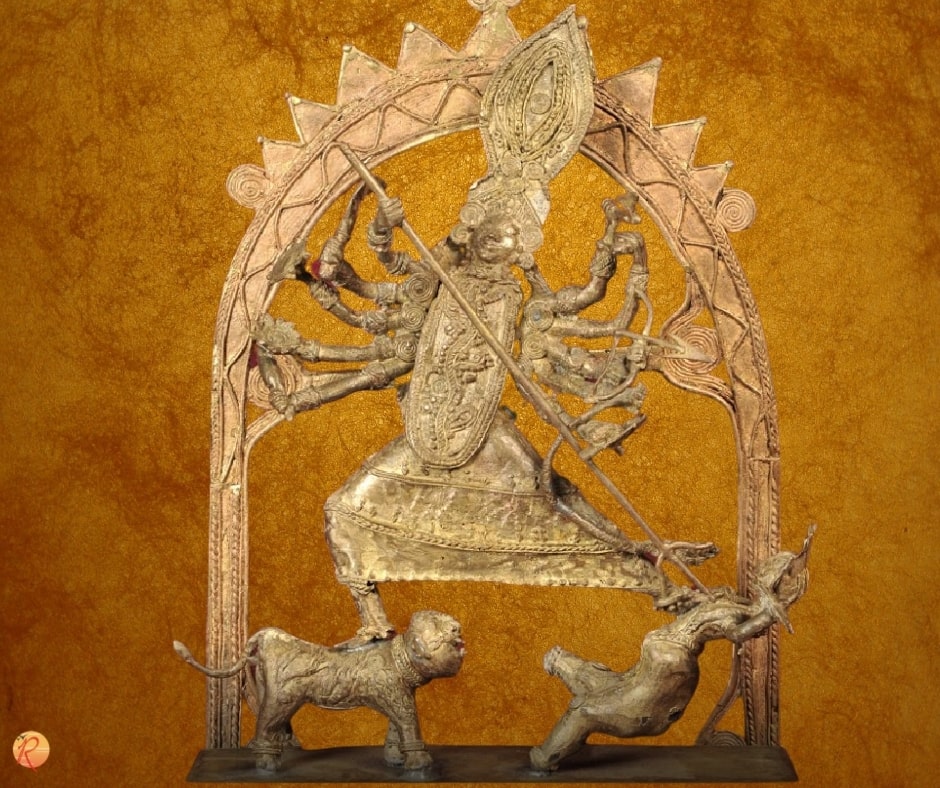
When the powers of the mind freshly awakening in man are at the mercy of the animal appetites, we have the birth of the Rakshasa. When the mind grows into a sharper intelligence but the heart remains cold and the intellect is used consciously to satisfy the animal appetites, we have the birth of the Asura. It is only when the heart is touched by the ray of love from within and the mind is attracted by a light, however distant and remote, from Above, that the proper human journey begins.
By obeying the soul’s Godward impulsion the human being grows into the likeness of a god whence becoming one with the cosmic powers of light he participates as an ally of the gods in the cosmic labour to help other souls and creation grow towards truth and Light and Freedom and Immortality. But this is no easy task.
The Rakshasa and the Asura continue to halt his advance, and even capturing some of the fields of nature that were conquered by the growing godhead in humanity. This is the well-known devāsura sangrām, the battle between the gods and the titans. It is at once an individual and a cosmic battle which Sri Aurobindo points out in his essay titled ‘The Doctrine of the Mystics’:
“The soul of man is a world full of beings, a kingdom in which armies clash to help or hinder a supreme conquest, a house where the gods are our guests and which the demons strive to possess; the fullness of its energies and wideness of its being make a seat of sacrifice spread, arranged and purified for a celestial session.”
(CWSA, Vol. 16, p. 30)
The Gods and the Titans
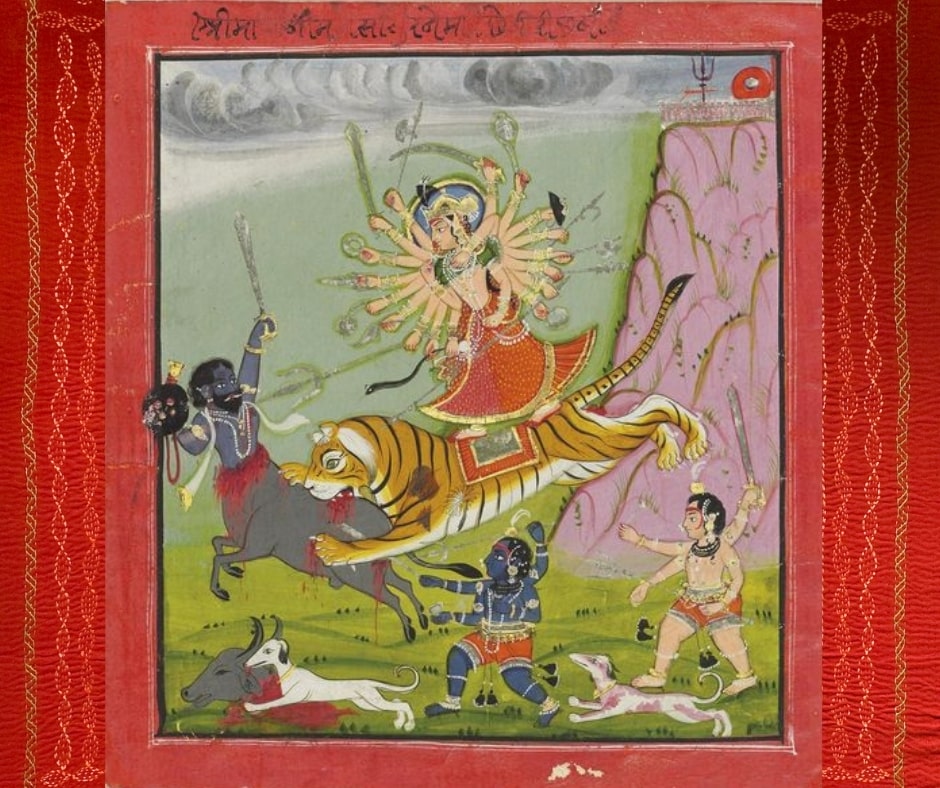
It is against this background that we can understand the story of Goddess Durga slaying the demons along with their king Mahishāsura. Mahishāsura is the ill-begotten child of the asura king Rambha and a buffalo-woman. Buffalo is clearly symbolic of an animal type of humanity that is largely tāmasic and full of greed and lust. Now Mahishāsura, like almost all asuras, covets the treasures and kingdoms of the gods. But he eyes all that with lust and greed rather than the path that is proper for an ascent towards the kingdom of the gods.
See:
Navadurga — The Nine Forms of the Goddess
The proper path is through a sacrifice or the progressive refining and sublimation through purification of the animal energies in us. But the asura will have none of these. He rises in revolt and wants to storm into the kingdom of heaven not for or through an inner change, but for an expansion of his ostentatious empire of lust and domination and control.
That is why he is not favoured by the indwelling Universal Godhead Narayana who has to keep the balance of dharma. That is why the asuras tend to eventually lose even when sometimes being on the verge of their victory. Sri Aurobindo reveals the subtle difference between these two types of striving:
“God and Titan, Deva and Asura, are indeed close kin in their differences; nor could either have been spared in the evolution. Yet do they inhabit opposite poles of a common existence and common nature. The one descends from the light and the infinity, satisfied, to the play; the other ascends from the obscurity and the vagueness, angry, to the struggle.
All the acts of the God derive from the universal and tend to the universal. He was born out of a victorious harmony. His qualities join pure and gracious hands and link themselves together naturally and with delight as in the pastoral round of Brindavan, divine Krishna dominating and holding together its perfect circles.
To evolve in the sense of the God is to grow in intuition, in light, in joy, in love, in happy mastery; to serve by rule and to rule by service; to be able to be bold and swift and even violent without hurt or wickedness and mild and kindly and even self-indulgent without laxity or vice or weakness; to make a bright and happy whole in oneself and, by sympathy, with mankind and all creatures. And in the end it is to evolve a large impersonal personality and to heighten sympathy into constant experience of world-oneness. For such are the Gods, conscious always of their universality and therefore divine.
[…]But the Titan will have nothing of all this; it is too great and subtle for his comprehension. His instincts call for a visible, tangible mastery and a sensational domination. How shall he feel sure of his empire unless he can feel something writhing helpless under his heel, —if in agony, so much the better? What is exploitation to him, unless it diminishes the exploited?
To be able to coerce, exact, slay, overtly, irresistibly, —it is this that fills him with the sense of glory and dominion. For he is the son of division and the strong flowering of the Ego. To feel the comparative limitation of others is necessary to him that he may imagine himself immeasurable; for he has not the real, self-existent sense of infinity which no outward circumstance can abrogate. Contrast, division, negation of the wills and lives of others are essential to his self-development and self-assertion.
The Titan would unify by devouring, not by harmonising; he must conquer and trample what is not himself either out of existence or into subservience so that his own image may stand out stamped upon all things and dominating all his environment. In Nature, since it started from division and egoism, the Titan had to come first; he is here in us as the elder god, the first ruler of man’s heaven and earth. Then arrives the God and delivers and harmonises.
Thus the old legend tells us that the Deva and the Asura laboured together to churn the ocean of life for the supreme draught of immortality, but, once it had been won, Vishnu kept it for the God and defrauded the fiercer and more violent worker. And this seems unjust; for the Asura has the heavier and less grateful portion of the burden.
He begins and leads; he goes his way hewing, shaping, planting: the God follows, amends, concludes, reaps. He prepares fiercely and with anguish against a thousand obstacles the force that we shall use: the other enjoys the victory and the delight. And therefore to the great God Shiva the stained and stormy Titan is very dear, — Shiva who took for himself the fierce, dark and bitter poison first churned up from the sea of life and left to others the nectar.
But the choice that Shiva made with knowledge and from love, the Titans made from darkness and passion, — desirous really of something very different and deceived by their stormy egoism. Therefore the award of Vishnu stands; to the God shall fall the crown and the immortality and not, unless he divinise himself, to the proud and strenuous Asura.”
(CWSA, Vol. 13, pp. 152-154)

